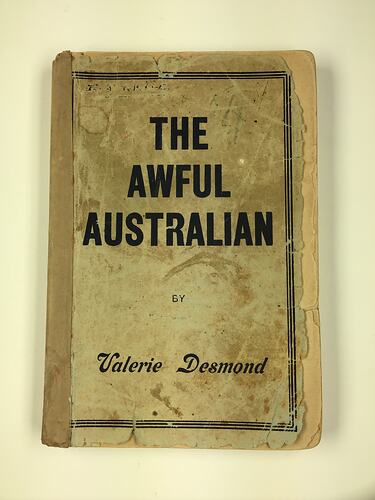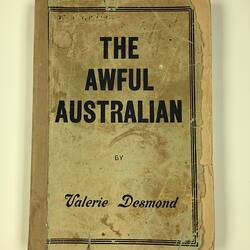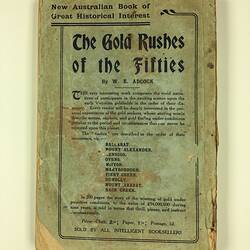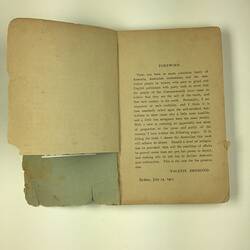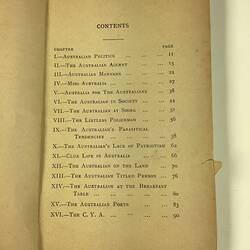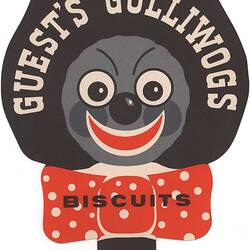Summary
Note: This object includes cultural stereotypes. Such representations are not condoned by Museums Victoria which considers them to be racist. Historical distance and context do not excuse or erase this fact.
Book entitled 'The Awful Australian', by Valerie Desmond, published by Coles Book Arcade Printing Dept, 1911.
'The Awful Australian' offers a highly critical satirical assessment of Australia and Australians - including politics and politicians, the Australian accent, women, manners and behaviour. patriotism, and intellect. There is also a chapter critiquing Australia's race-baced immigration policy, racist attitudes and the dictation test (although the author peppers the observations with racist descriptors herself). There is some debate about who the author was with theories including that the author was a man writing under a female pen name; or an English woman (a journalist according to The Argus 13/3/1956, p.5) travelling with Lady Dudley, wife of the then Governor-General, in 1910.
Significance
Statement of Historical Significance:
This publication offers a valuable addition to the Museum's collections relating to Australian identity, nationalism, cultural stereotypes and prejudice.
'The Awful Australian' (1911) offers a critical satirical assessment of Australia and Australians - including politics and politicians, immigration policy, the Australian accent, women, manners and behaviour, patriotism and intellect. The book sparked responses at the time in the press, including the Sydney Morning Herald: 'Miss Desmond is a past mistress in the art of vituperation and invective, and is equal to the task she has set herself. Her book will probably have a considerable circulation, and she will have no reason to complain of its reception.' http://trove.nla.gov.au/newspaper/result?q=%22valerie+desmond%22.
Described as part of the Candid Critique Series, the book was published by EW Cole who was not averse to social critique. Desmond's lamenting of the Australian accent was part of a broader critique popular around that time in Australia and the UK (including by Nellie Melba and Winston Churchill).
More Information
-
Collecting Areas
Cultural Diversity, Leisure, Migration & Cultural Diversity, Politics & Society, Public Life & Institutions
-
Publisher
Coles Book Arcade Printing Department Melbourne, Melbourne, Victoria, Australia, 1911
-
Classification
-
Category
-
Discipline
-
Type of item
-
Keywords
National Identity, Cultural Stereotypes, Politicians, Publishing, Travel
